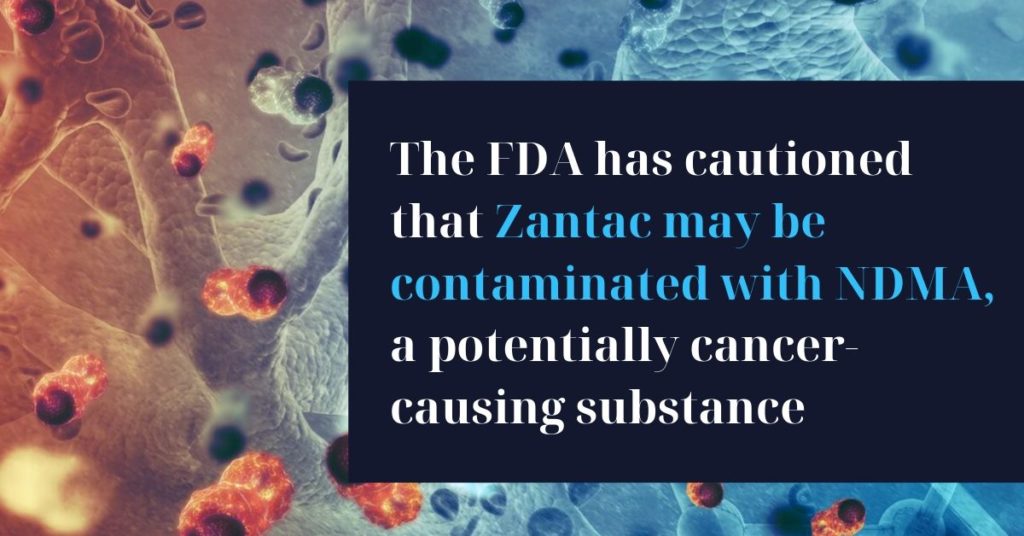It is important to know that the NDMA in ranitidine products does not pose any immediate health risks. The FDA noted.
 Zantac Cancer Risk What You Need To Know About Ndma Contamination
Zantac Cancer Risk What You Need To Know About Ndma Contamination
The actual health risks depend on dose and will vary from person to person.

Ranitidine cancer risk. Ranitidine and other medications that decrease stomach acid have been linked to an increased risk of acute gastroenteritis and community acquired pneumonia in children. Among subjects without risk factors including smoking obesity alcohol use family history cirrhosis and GERD the risk of all cancers excluding non-melanoma skin cancers was identical for ranitidine and famotidine OR1 CI101. He does not want to discuss the study until the findings are published in a peer-reviewed journal according to Caitlin Hool a hospital spokeswoman.
Results From UK Biobank. Long-term exposure over years can increase an individuals risk of developing cancer. For example 34 of ranitidine users and 38 of those taking famotidine were.
Does Zantac Pose a Cancer Risk. The majority of these users have developed cancers of the stomach esophagus and other areas of the GI tract where ranitidine. Although consumption of NDMA has been positively associated with gastric and colorectal cancer experts arent exactly sure just how big a risk it poses.
Although the FDA advisory states that the level of NDMA contamination is minimal in Zantac some levels were 3000 to 26000 times more than what the FDA says is safe. FDA will post that information when it is available. The additional risk posed by NDMA from ranitidine at the levels identified to date is considered to be very low.
The medication may also mask the symptoms of stomach cancer. According to researchers publishing their findings in the scientific journal Cancers patients who used Zantac may have an increased risk of several types of cancers including esophageal stomach and colorectal cancer. FDA Recall and Zantac Cancer Risks.
Ranitidine Use and Cancer Risk. However sustained higher levels of exposure may increase the risk of cancer in humans. Light said studies conducted in the 1980s raised concern about potential safety risks.
The FDA has requested that companies recall their ranitidine if testing shows levels of NDMA higher than the acceptable daily intake of 96 ng or 032 parts per million for ranitidine. Ranitidine users had a numerically lower risk for GI cancers liver stomach esophageal colorectal and pancreatic cancers compared to famotidine. He does not want to discuss the study until the findings are published in a.
Lior Braunstein a Memorial Sloan Kettering oncologist and researcher is studying ranitidine and cancer risk. Food and Drug Administration FDA announced that manufacturers should immediately pull all prescription Zantac and over-the-counter Ranitidine drugs from the market due to a cancer-causing risk. In September 2019 ranitidine and nizatidine were suggested to contain N-nitrosodimethylamine a carcinogenic substance.
If they had known of the possible cancer risks a large number of consumers would not have purchased ranitidine products. The objective of this study was to investigate the risk of cancer among people receiving ranitidine or nizatidine compared with other. Epub 2020 Dec 29.
Lior Braunstein a Memorial Sloan Kettering oncologist and researcher is studying ranitidine and cancer risk. In a sensitivity analysis the association between ranitidine and overall cancer risk was null in the first 5 years of follow-up and inverse thereafter. Results From UK Biobank.
Neither the FDA nor NovartisSandoz or Apotex have received any reports of adverse events related to NDMA found in ranitidine. Ranitidine is not recommended for patients that have kidney or liver impairment. Ranitidine Use and Cancer Risk.
These low levels would not be expected to lead to an increase in the risk of cancer. Ongoing investigations found that levels of NDMA increase over time within the medication and as temperatures increase. Ranitidine Use and Cancer Risk.
Many people have been using ranitidine for years even decades before the recall and there are still many who are unaware of the dangers. Although classified as a probable carcinogen NDMA may cause cancer only after exposure to high doses over a long period of time. People have since been concerned about the potential impact of ranitidinenizatidine use on the risk of cancer.
Regular ranitidine use yesno was associated with a nonsignificant decreased risk of kidney cancer. But cancer risk factors were markedly more common for the H2 inhibitor users. On April 1 2020 the US.
According to study results reported in Drug Safety there is no evidence that ranitidine or nizatidine are associated with an increased risk of cancer although further studies with more accurate measurement of exposure inclusion of older people and longer follow-up may be needed. Authors Elizabeth D Kantor 1 Kelli OConnell 2 Mengmeng Du 2 Robin B Mendelsohn 3 Peter S Liang 4 Lior Z. Results From UK Biobank Gastroenterology.
As for NDMA being found in ranitidine it is important to know that there are no immediate health risks associated with its use nor currently any reports of adverse events related to its presence in ranitidine. NDMA is one of the same. However such contamination is considered unacceptable for a medicine.
The FDA is evaluating whether the low levels of NDMA in ranitidine pose a risk to patients. Study Findings Suggest Ranitidine is Associated with an Increased Risk of Cancer. Ranitidine Cancer Risk.
This association strengthened in the active comparator analysis HR 039. Patients should be able to trust that their.